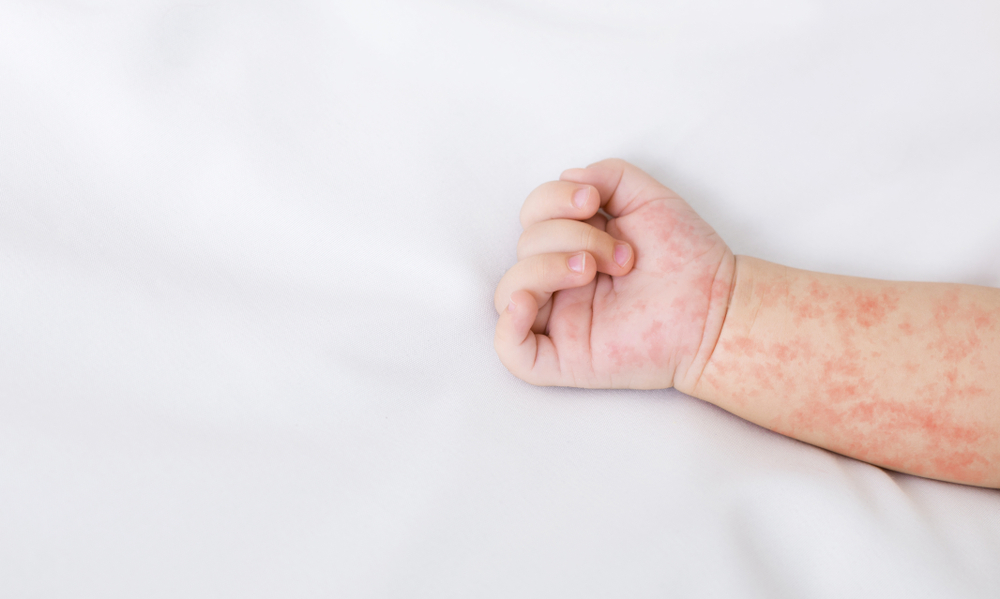
By Professor Claire Anderson, RPS President
 There is a worrying resurgence of measles cases, with 368 confirmed cases in England last year, and a rapid increase in cases in the West Midlands since October 2023. This is due to a decline in children being vaccinated, with 1 in 10 children starting school in England unprotected, according to the UK Health Security Agency. With health bodies across all the nations urging parents to get their children vaccinated, what do you need to know about measles to keep you and your family safe?
There is a worrying resurgence of measles cases, with 368 confirmed cases in England last year, and a rapid increase in cases in the West Midlands since October 2023. This is due to a decline in children being vaccinated, with 1 in 10 children starting school in England unprotected, according to the UK Health Security Agency. With health bodies across all the nations urging parents to get their children vaccinated, what do you need to know about measles to keep you and your family safe?
How can you catch measles?
Measles is a highly infectious and potentially serious viral illness that primarily affects children. It’s passed from person to person via droplets which are released into the air when an infected person coughs or sneezes. The virus can live on surfaces for several hours and you can catch measles by touching that surface and then placing your hands near your nose and mouth.
How long does measles last?
Measles usually lasts for seven to ten days and although it is often unpleasant, most cases pass without any additional complications.
However, it can lead to serious, and sometimes life-threatening illnesses, such as pneumonia and meningitis, as well as life changing complications including blindness and deafness. Serious complications are more likely to develop in children under five, children with a poor diet and those with a weakened immune system.
The symptoms of measles are:
- Cold-like symptoms such as sneezing and a high temperature
- A cough
- Sore, red eyes which are sensitive to light
- Small greyish-white spots on the inside of the cheeks
- Reddish-brown blotchy rash which usually appears a couple of days after the other symptoms
What to do if you or your child has measles
Isolate - As measles is highly contagious, it's crucial that the person with measles is isolated to prevent spreading the virus to others. Stay home from work, school, and public places to avoid exposing others to the infection.
Contact your GP - If you think that you or your child may have measles you should contact your GP. It is important to call the surgery before you attend so that they can take steps to reduce the risk of other patients becoming infected whilst you’re there.
Rest and hydrate - Get plenty of rest to help your body fight off the infection. Drink plenty of fluids, such as water, herbal tea, or electrolytes (drinks with minerals like sodium, potassium, and magnesium, which your body needs to function properly), to stay hydrated and support your immune system.
Avoid contact with others - Minimise close contact with family members, especially those who are unvaccinated or have weakened immune systems, to prevent spreading the virus.
If you or your child has received two doses of the Measles, Mumps and Rubella (MMR) vaccine or previously had measles then it is unlikely to be measles – there are a number of other conditions with similar symptoms. If you have any concerns, speak with your GP.
Warning signs to look out for:
- Shortness of breath
- Sharp chest pain that is worse when breathing in
- Coughing up blood
- Drowsiness
- Confusion
- Convulsions (fits)
If you or your child develops any of these symptoms you should go to your nearest accident and emergency (A&E) department or dial 999 for an ambulance.
Treatment for measles
There is no specific treatment for measles, but there are a number of things you can do to ease the symptoms in uncomplicated cases:
- Paracetamol can be used to reduce a high temperature and relieve pain
- Closing blinds/curtains or dimming lights can help with sensitivity to light
- A sore throat or a cough can be soothed with hot drinks, particularly those containing honey and lemon. It is important to note that honey should not be given to babies under 12 months
- Drink plenty of fluids to avoid dehydration
- Wash away crustiness around the eyes with damp cotton wool
Your local pharmacist will be able to advise you on the best treatment for your symptoms. They will also make sure that any medicines you buy over the counter are safe to take with your regular medication, if you take any.
Protecting your child from measles
The best thing you can do to protect you and your family from measles is to make sure that you have all had two doses of the MMR vaccine. The first dose is usually given to babies when they are between 12 and 13 months old, and the second dose is given at three years and four months; but it is never too late to get vaccinated. If you’re not sure if you have received the vaccine, contact your GP surgery who will be able to check your records.
NHS information on the MMR vaccine.
Read more RPS blogs.